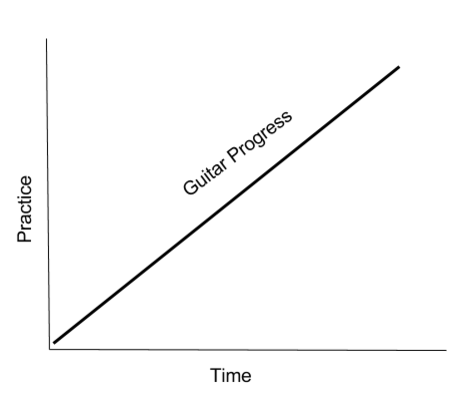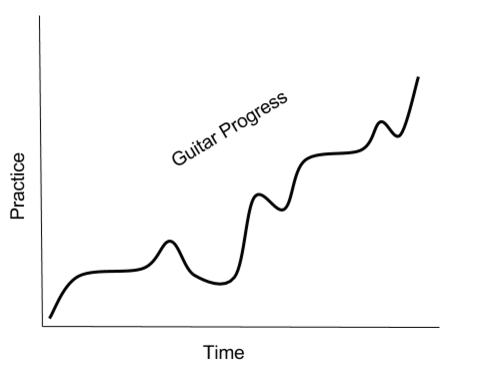I received a question from a concerned parent of one of my students.
The Question:
In your experience, what kind of practice time per week is normal/reasonable?
Now this student loves playing guitar and singing.
They always enjoy our lessons.
But this parent noticed that the student didn’t have the self-motivation to practice a lot.
When prompted, of course the student would practice… but it just wasn’t the go-to activity when there was no one else around.
The bigger question was: “Why doesn’t she just go in and play for fun?”
Great question.
Obviously we don’t want to make practicing a chore and take the fun out of the guitar. Nor do we want to nag our kids into practicing.
At worst – we risk turning them off to the guitar.
But we know that if they DID practice more, they would be thrilled at their progress.
It’s a delicate balance. So frustrating. I get it.
So…. what to do?
Pester them about practicing?
Reward them for practicing?
The Short Answer:
1. Given the choice, nobody wants to practice (myself included). Sometimes a gentle reminder is good/necessary. Even the most enthusiastic students have weeks where practicing is like pulling teeth. This is especially true over the holidays, or when there are a ton of other competing activities (sports, homework, social stuff, TV, etc).
2. I’m not a huge fan of incentivizing practice/playing. I feel like it turns the guitar into work/chore. But for some people it works. I’ve seen it done where the student has to practice in order to get TV time or something like that. Again… not a huge fan of this method.
3. I’ve had the most success when there is some sort of related motivator (e.g. having a concert to look forward to, being able to play with other people, the fun/excitement of learning a new song, writing my own songs, recording songs, etc).
4. Keep the guitar in a location that encourages practice: Out in the open in the bedroom is great. The bedroom is a private place where we can practice without being self-conscious (especially true for singers). If that doesn’t work, by the sofa in the family room is also good (pick it up in between commercials).
The Long Answer:
Generally speaking, more time you spend on the guitar, the better you will get.
Now, there are other factors at play here, such as the quality of your practice (which I’ve written about here).
Right now, we’ll keep it simple.
Most people assume that progress on a guitar looks like this:

As time and practice increase, you make progress.
Yup. Sounds good.
However, most people are not disciplined enough (myself included) to practice and see this kind of ever-increasing improvement.
It’s just not realistic.
Here is what progress on the guitar really looks like:

Ugly, right? But true.
There’s usually a nice little bump at the beginning (we’re all just so excited to learn how to play).
Then we start to plateau.
Those dips are your lacking motivation. Your disruptions to life. Your holidays. Your stressed out weeks at work. The kids’ sports commitments.
Those peaks are when the motivation strikes and you remember why you started playing in the first place. Something piques our interest (a new song, a concert to prepare for, a jam session with friends). And we’re back into practicing and improving.
Then we slow down.
And it continues.
Over and over and over.
And it’s not unique to guitar playing.
It works for everything: Eating healthy, exercise, keeping the house clean. Whatever.
The point is to accept the lulls in the practice regimen. Understand that it’s natural.
Understand that it’s ok…. as long as that curvy line continues to move upward.
It’s hard to tell on a daily basis if that’s happening. Especially if it’s you (or your child) learning to play the guitar. As a teacher, I can tell…. and I can tell on a weekly basis.
- If I find that week by week we’re covering the same material…. we’ve hit a lull. That’s ok.
- If I find that we’re reviewing older material…. we’re regressing… not good.
- If I find that the student doesn’t have an interest in addition to all of this… maybe the guitar isn’t for them.
But for those of us who still want to learn – who still enjoy the guitar – but struggle to practice consistently….
We need something….
We need either discipline or motivation.
Discipline
The disciplined guitar player’s trajectory looks like line graph number 1. It’s pretty straight and always progressing.
I hate the disciplined guitar player.
These are the students who sit down and practice intentionally.
Who, even when they don’t FEEL like it, sit down and practice.
Maybe twice a week, maybe every day.
It’s not about the frequency, it’s simply the fact that they have the discipline to get the work done.
Truly, this is the best way to make progress.
But this is not me.
And I don’t think this is most kids.
If this is you, I don’t know why you’re reading this article and I admire and hate you for your discipline (really I’m just jealous).
So if you’re not in the disciplined group, then we have to rely on motivation.
Motivation
Motivation waxes and wanes (just like our squiggly line graph number 2).
As it applies to the guitar, let’s say that motivation can be either unrelated/external or related/internal.
Unrelated/External Motivation
This would be like rewarding yourself (or child) for practicing.
In other words, you incentivize the practicing somehow.
Maybe they get extra TV time.
Maybe they can stay up later.
Maybe they have a sticker chart and get a new sticker every time they practice and then get a reward when they get a certain amount of stickers.
I’m not a huge fan of external motivation. It makes the reward (the sticker, the TV, etc) the goal, rather than the actual playing of the guitar the goal. In other words, it turns the guitar into work.
Playing the guitar should be the reward in itself. Despite that you may get frustrated or not play every day, it should still be fun and enjoyable. If it’s not… why are we doing this?
Related/Internal Motivation
Sometimes the act of playing the guitar isn’t enough. So if you need to create a motivation/reward system, try to keep it somewhat related to the guitar.
Here’s what’s worked for me in the past:
- Upcoming concert or recital
- Upcoming gig or event
- To become a better guitar teacher
- Jam session with other musicians
- Learning a new song
- Writing my own songs
- Recording my guitar playing and/or singing
- Recording and putting my songs on youtube
- Learning a new style of music
- Learning a new technique
- Learning a song for a friend
- Switching from acoustic guitar to electric
- Switching form electric guitar back to acoustic
- Trying ukulele for awhile
- Trying classical guitar
- To impress girls
- To impress your family or friends or work colleagues
- To impress basically anyone.
- To be a rock star
- To be the next Bob Dylan
- To be the next Paul Simon
- To be the next Mark Knopfler
To be the next Taylor Swift
Ok… you get it.
The Recap:
Motivation is good if it’s related to the guitar.
Discipline is better (but harder to achieve and more painful).
If you’re lucky, playing the guitar will be a lifelong pursuit.
You’ll always want to learn more and more.
But you’ll never be satisfied.
You’ll get frustrated.
You’ll want to quit.
But you won’t.
I started playing guitar when I was 10 years old….. and quit after 2 months because I hated it. It wasn’t until I was 14 that I picked it up again.
Before I started doing this for a living there were weeks (sometimes months) at a time when I didn’t feel compelled to play. The guitar would stay buried deep in my closet… so sad… I know.
But for whatever reason I kept going back to it. And still do. And probably always will. It’s a sweet and terrible blessing and curse.
(Jake Posko does in-home and online guitar lessons in the Annapolis, Maryland area including: Annapolis, Edgewater, Severna Park, Pasadena, Crownsville, Arnold and Kent Island, inquire about lessons by e-mailing him at jake@jakeposko.com).
One reply on “How Much Should I (or my kid) Practice the Guitar?”
[…] If you want more details about practicing (and how much you should practice) check out this article. […]